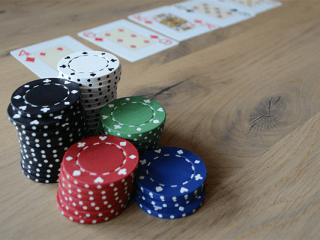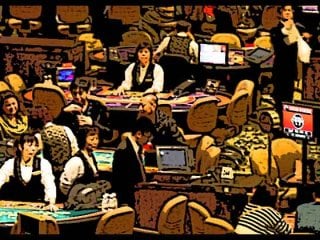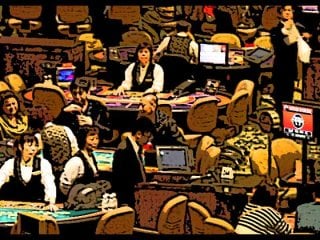How Many Hands Per Hour: Live Poker Explained
By Alex Smith, Last updated Apr 30, 2024

The number of poker hands you can play in live poker games or online games can significantly impact your poker strategy and profitability. Those new to live poker may not know that there’s a substantial difference in hand speed at live poker games compared to when you play at online poker sites.
Of course, experienced players are well aware of this difference, but those new to live poker may not be. In this blog post, we’ll dive into the factors influencing the number of hands dealt per hour in live poker. While this blog focuses primarily on the live game, we’ll also touch briefly on playing online and how the hand-per-hour speed changes and look at why.
Typical Hands per Hour in Cash Games
So, what is the typical hands-per-hour rate in live poker? Players generally expect 25-30 hands per hour in live cash games. This is considered the average per hour – far fewer than the tens of thousands some players can get online by multi-tabling!
It’s important to note that this average can fluctuate slightly based on various factors. Very high and low-stakes games generally take longer: Less-experienced players are prone to making mistakes, slowing the action. In contrast, high-stakes games usually afford additional time to players due to the stakes involved.
Factors that Affect the Number of Hands Per Hour in a Poker Game
Dealer Ability and Speed
One of the primary factors influencing the speed of live poker is the dealer’s speed and ability to manage the game. A seasoned dealer can maintain a fast pace, ensuring that cards are dealt efficiently and pots are pushed to winners immediately. The best dealers have mastered handling chips, managing the deck, and running the game smoothly. If you start playing at a table with a competent dealer, you’ll play far more hands than at a live game dealt by an inexperienced dealer.
Why do inexperienced or slower dealers significantly reduce the game’s pace? Because they may struggle with the ins and outs of dealing, such as handling chip denominations, reading players’ bets, or managing side pots. These challenges can lead to delays and interruptions in the game’s flow. Thankfully, most land-based casinos require dealers to have completed extensive training – but there’s no denying there are dealers who aren’t as experienced as others.
Note: High-stakes games typically have higher standards for dealers. The likelihood of you running into inexperienced dealers during larger cash games and more notable tournaments is slim.
Player Decision-Making Time
Another crucial factor affecting hands per hour is the decision-making time players take. In online poker, players have a limited time to act before the clock runs out. Of course, players don’t have unlimited time in live games, but typically, they’re given much longer to act than on most poker sites. While this offers a high degree of flexibility, it can also lead to slower play.
Some players may take longer to contemplate their moves, determining their hand’s strength, their opponents’ potential range, and the optimal strategy for the situation. They might take much longer than they would if they were playing at an online poker site, and while this approach can benefit their game, it can significantly slow down the overall pace of play.
Additionally, some players are prone to “tanking”—taking excessive time to decide, even in relatively straightforward spots. Unfortunately, this is one of the differences you must get used to as a poker player if you want to play live games.
Distractions and Off-the-Table Activities
In a live poker setting, distractions and off-the-table activities can further impact the pace of play. Players might chat with others at the table, discussing anything from poker strategy to their personal lives. While this social interaction is one of the fundamental aspects of live poker, it can also slow down the game, especially if they’re chatting during a hand.
Moreover, players may take breaks to answer phone calls, respond to text messages, or temporarily step away from the table. These interruptions, while understandable, contribute to a slower overall pace. Players may also order food or drinks at the table, which can lead to further delays.
Game Format and Table Size
The game format and table size also significantly affect hands per hour. Full-ring games typically involve nine or ten players and generally see fewer hands dealt per hour than short-handed games with six or fewer players. With more players at the table, more decisions are needed, and more time is spent waiting for each player to act.
The time between two hands in a full-ring game can be surprisingly long! After all, every poker player has to act and decide if they want to play their poker hands, which can significantly affect the speed of game play. Naturally, nothing can be done about this: again, it’s simply a part of poker.
Physical Actions and Chip Handling
The physical nature of live poker also contributes to a slower pace than online play. In a live game, players must physically handle their chips, place bets, and collect their winnings. These actions, while part of the game, take time to complete.
When a player wants to make a bet, they must manually select the correct amount of chips from their stack, count them out, and place them in the pot. This process is typically far more time-consuming than clicking a button or entering a bet amount as you would when playing online. Similarly, when a player wins a hand, the dealer must gather the chips from the pot and distribute them to the winning player, something that’s also absent when playing online.
Furthermore, the physical act of dealing cards means cards are dealt slower than an online ring game. Don’t forget: dealers must collect the cards from the previous hand, shuffle the deck, and then distribute the cards to each player.
Table Limits and Stakes
When more significant sums of money are at risk, players tend to be more cautious and deliberate in their decision-making. They may take extra time to analyze the situation, consider their opponents’ ranges, and determine the most profitable action. This added consideration can lead to fewer hands per hour.
Conversely, lower-stakes games might move a bit faster. Players at these tables are often more recreational and less concerned with making optimal decisions on every single hand. They may be more inclined to play a higher percentage of hands and make quicker decisions, resulting in a slightly higher hands-per-hour rate.
When you’re playing low-stakes games, you’ll often see a poker player forgetting to post their big blind or making mistakes that require dealer intervention. This slows the number of hands played each hour and can worsen significantly during home games when the lowest stakes (or none) are used.
Venue and Poker Room Variations
The specific poker room or casino can also impact the pace of play. Some venues are known for their efficient operations and well-trained staff. They may have experienced dealers who can maintain a faster pace and minimize delays. Some poker games, usually tournaments, have short decision windows designed to force players to act quickly.
On the other hand, some poker rooms may have a reputation for slower play. This could be due to less experienced dealers, a more relaxed atmosphere, or a player base that takes longer to make decisions. You should try to gauge how a poker room operates when you first begin playing so you know roughly how many hands you can expect to play each hour.
Local Customs and Etiquette
The culture of a poker community can also influence the game’s overall speed. In some regions, players may have a more laid-back approach to the game, enjoying the social aspects as much as the strategic elements. This relaxed atmosphere can contribute to a slightly slower pace of play.
In many European countries, it’s common for poker players to plug in their headphones and disconnect from the world while playing. In Asia, on the other hand, poker games are often far more sociable. This is something to be aware of, especially if you’re traveling to play cash games and tournaments abroad.
Hand Speed in the Online Poker World
When transitioning from live poker to online poker, you will immediately notice a significant difference in the pace of play. Online poker offers a much faster gaming experience, with considerably more hands dealt per hour than traditional brick-and-mortar casinos.
This increased speed is due to various factors inherent to the online poker environment. Typically, you will get dealt about 75 hands per hour in online poker if you’re sat at a table with nine players. This increases to around 90 hands per hour in cash games with six players. If you’re playing fast-fold games like PokerStars Zoom poker, this can increase to as many as 250 hands per hour. This is why online play is preferable to professionals, especially if they can concentrate while multi-tabling.
Let’s explore some of the reasons why there are many more hands played online compared to in a live game.
Automated Dealing and Chip Handling
One primary reason for faster hand speeds in online poker is the automated nature of dealing and chip handling. Unlike live games, where a human dealer must physically shuffle, deal cards, and manage chips, online poker sites use software to handle these tasks automatically.
There are no delays due to the manual dealing process, which allows substantially more poker hands to be dealt with each hour. Even full-ring games see significantly more hands played hourly when compared to a live poker game.
Plus, the next one begins as soon as a hand is finished, with no need for the dealer to manually shuffle.
Preset Betting Amounts
Online poker platforms typically allow players to select from preset betting amounts. For example, if a poker player has made a raise, most poker sites will have a button that automatically displays how much it would cost to place a 25%, 50%, or 100% raise. This lets players quickly select their desired bet size from predefined options rather than manually counting out chips.
This not only saves time but also reduces the likelihood of errors. Additionally, online poker sites employ timers for each player’s decision, typically ranging from 15 to 30 seconds. If a player fails to act within the allotted time, their hand is automatically folded – although most games offer a period of leniency before this time limit is strictly enforced.
Lack of Physical Distractions
Physical distractions are minimized in the online poker world, allowing for a more focused and efficient gaming experience. Players don’t need to worry about handling chips, shuffling cards, or engaging in lengthy conversations with another poker player.
Most players online will mute their phones and disable notifications on their computers to prevent distractions, making significant differences in the number of poker hands played, even at a full-ring table.
Multi-Tabling Capabilities
One of the most significant advantages of online poker is the ability to multi-table, which dramatically increases the number of hands a player can experience per hour. Many online poker sites allow players to sit simultaneously at multiple tables, often up to four or more.
Players can significantly increase the number of hands they play hourly by sitting at multiple tables. For example, if a player is dealt 75 hands per hour at a single 9-max table, playing four tables simultaneously would result in approximately 300 hands per hour.
Strategies for Adapting to Different Hand Speeds
When faced with varying hand speeds in live poker, players must adapt their strategies accordingly. One fundamental approach is to adjust your playing style based on the table dynamics. If the game moves slowly, you may want to mirror this speed and slow down your game by focusing on strong starting hands and avoiding marginal situations.
Conversely, in a faster-paced game, you might consider opening up your range and playing more aggressively to take advantage of the increased number of hands dealt per hour.
Another crucial aspect of adapting to different hand speeds is time management. In slower games, use the extra time to analyze your opponent: examine their betting patterns and try to identify physical tells. This information can prove invaluable in making winning decisions.
Lastly, it’s essential to stay mentally focused and avoid distractions, regardless of the hand speed. In slower games, getting distracted between hands can be surprisingly easy, especially if you’re playing a full-ring game with ten players. Always try to maintain concentration and stay involved in the game, even when you’re not playing a pot. This will also allow you to better understand your opponents and their playing styles.
Tournament vs. Cash Game: Why Are Hand Speeds So Different?
The hand speeds in poker tournaments and cash games can differ significantly due to various factors. One primary reason is the varying structures and objectives of each format. In tournaments, players start with a fixed number of chips and aim to eliminate their opponents to win the entire tournament or finish in the money.
As the tournament progresses and blinds increase, players must make decisions more quickly to maintain their chip stacks. This time pressure often leads to faster hand speeds, as players cannot afford to spend too much time contemplating their moves.
In contrast, cash games have a more relaxed atmosphere, as players can top-up more chips whenever they wish. The blinds don’t increase (usually), and it’s generally considered a more relaxed poker game. Cash game players typically prioritize long-term profitability over short-term wins, leading to more calculated and time-consuming decisions.
Another factor contributing to the difference in hand speeds is the level of player experience. Tournaments, especially larger ones, tend to attract a more comprehensive player pool, including amateur and recreational players who may take longer to make decisions. A cash poker game usually sees better players, but this is not always true.
Famous Players Known for Fast Playing
Several poker players have become known for their fast-playing styles. One such player is Tom “Durrrr” Dwan, who rose to fame in the online poker scene during the late 2000s. Dwan was known for his ultra-aggressive style and his ability to make quick, seemingly impulsive bets and raises that put his opponents under intense pressure. He would go on to become one of the most successful cash poker game players in history, both live and online.
Another player renowned for his fast play is Viktor “Isildur1” Blom. Like Dwan, Blom made a name for himself in online poker, frequently playing in the highest poker game available. His playing style was characterized by relentless aggression and a willingness to make insanely large bets – and bluffs.
Players like Phil Ivey and Tony G are also known in the live poker circuit for their speed. Ivey, widely regarded as one of the best all-around players in the world, is known for his ability to read opponents and make almost instant—usually accurate—decisions. His fast play often puts opponents on the back foot, forcing them to make tough choices under pressure.
Similarly, Tony G’s aggressive and talkative demeanor at the table is complemented by his rapid decision-making, which can unsettle opponents and disrupt their concentration.
Ultimately, there’s no right or wrong way to play an online or live poker game. Don’t get too caught up on the number of hands you play per hour, but do try to keep it in the back of your mind as it can be important, especially if you’re using heads-up displays, multi-tabling, or playing in fast-fold games like PokerStars Zoom.
Conclusion
Understanding the concept of hands per hour in live poker is important, although, as mentioned, it’s not something you should get too caught up on, especially if you’re new to live poker.
To summarize: on average, players can expect around 25-30 hands per hour in live cash games, although this rate can vary significantly due to factors like table stakes, the venue, and the vibe of the table. If you find yourself in a slower game, do your best to adapt – the same can be said for online games, too.
Similarly, if you find yourself in a fast-paced full-ring game, it can be tempting to start gambling like the rest of the table. And, while this can be a valid poker strategy, it can also be an excellent time to sit back, limit your starting range, and try to “pick off” other players at the table who are playing loosely.
Other Interesting Articles You Should Read
How Does a Casino Make Money on Poker?
It will come as no surprise to learn that online poker sites and online casinos are in the business of making money; that’s their ultimate goal, and while many of these sites may offer attractive – and lucrative – bonuses and promotions designed to temp in new players, the ultimate goal is to generate as much revenue as possible.
How to Play Slow Roll Poker
The goal of poker is to beat your opponent; in fact, doing so is actively encouraged! However, while you should always try your best to throw your opponents off-balance and coerce them to make mistakes
What is the Dead Man’s Hand in Poker?
The deadman’s hand is one of the most iconic hands in poker. While some players have slightly different definitions of the dead man’s hand, most people regard it as a hand containing two Aces and two Eights – equalling two pairs. However, while the hand may look quite simple, there is much more to meet the eye.
What Happened to Mike Matusow
If you’re wondering what’s actually happened to Mike Matusow – and want to know what this colorful character is up to these days – keep reading to find out what this star poker player is up to these days!
How to Play Red Dog
Red Dog, also known as Red Dog Poker, is quite a popular game. Today, you will find it offered at most online casinos. Some land-based casinos also offer it, although it’s not found as commonly.








